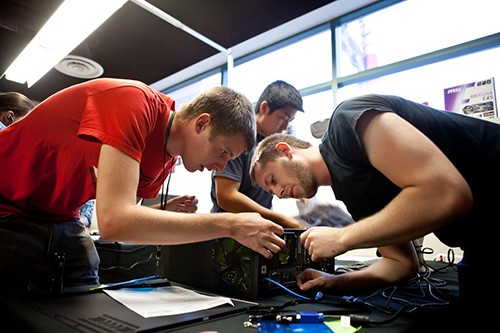UA students took home five $1,000 scholarships after winning the annual Avnet Tech Games, a statewide collegiate technology competition on April 9.
The competition, hosted by Microsoft, tests technical skills, innovative problem solving and utilizing professional skills.
Held at the University of Advancing Technology in Tempe, 54 teams of students from 13 Arizona universities and community colleges competed.
Participants benefit from the games because they have the chance to win scholarships, gain experience, meet captains in the industry and compete in a global environment, according to Teri Radosevich, the vice president of community relations at Avnet Inc.
“”It doesn’t matter if you have straight ‘A’s’ or not,”” she said. “”This shows people that you have leadership experience.””
She explained that almost all the games are built around real world scenarios, and that sometimes they go wrong or there are equipment problems. The students, she said, then have to think on their feet and figure out what to do.
Brandon Kvarda, a management information systems
senior, was one of the three participants who won the “”AMD Fastest Computer,”” a game where students must design, build, troubleshoot and tune a PC the fastest. As a first-time competitor, he said that he tried to take his time and do things without messing up.
He explained that the Tech Games were particularly “”awesome”” for the UA teams because they did not make any mistakes resulting in point deductions during any of the events.
“”This was actually the reason why we won,”” he said.
His teammate, management information systems senior Jesse Zhang, said that the hardest part about designing and building a PC was trying to figure out what the “”clients”” wanted and explaining important factors to them such as cost.
UA students also won the “”Win the Pitch-Event Creation”” event, where students pitch a theme or tag line, graphical treatment, motivational video and stage design concept for “”Omni Corporation International,”” a fake event used for competition purposes.
UA students Ryan Miller and Darren Thompson created the winning space exploration theme.
“”We wanted to tie it into the company’s overall demand to create new ideas, take risks, and think outside of the box,”” said Thompson, a marketing and entrepreneurship senior.
Thompson added that his biggest challenge in creating a theme was that it was “”very ambiguous”” because he was unsure of what exactly the judges wanted.
The judges included a panel of technology firm executives, engineers and technical experts. Students competed in nine different games and the event also included a sponsor showcase and networking event to help students connect with prospective employers.









